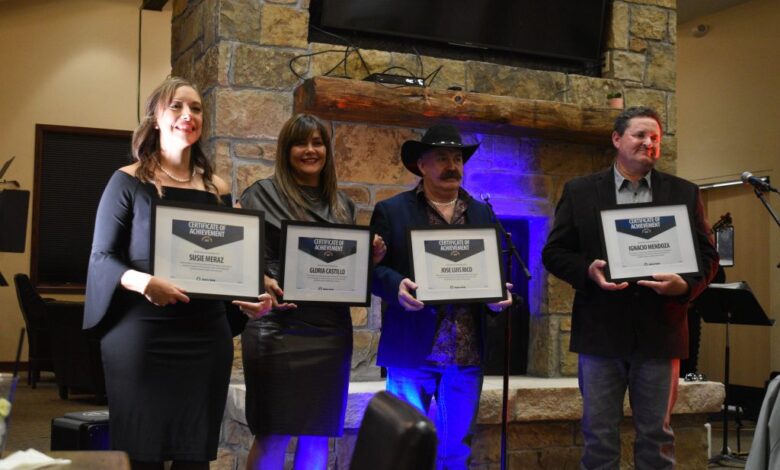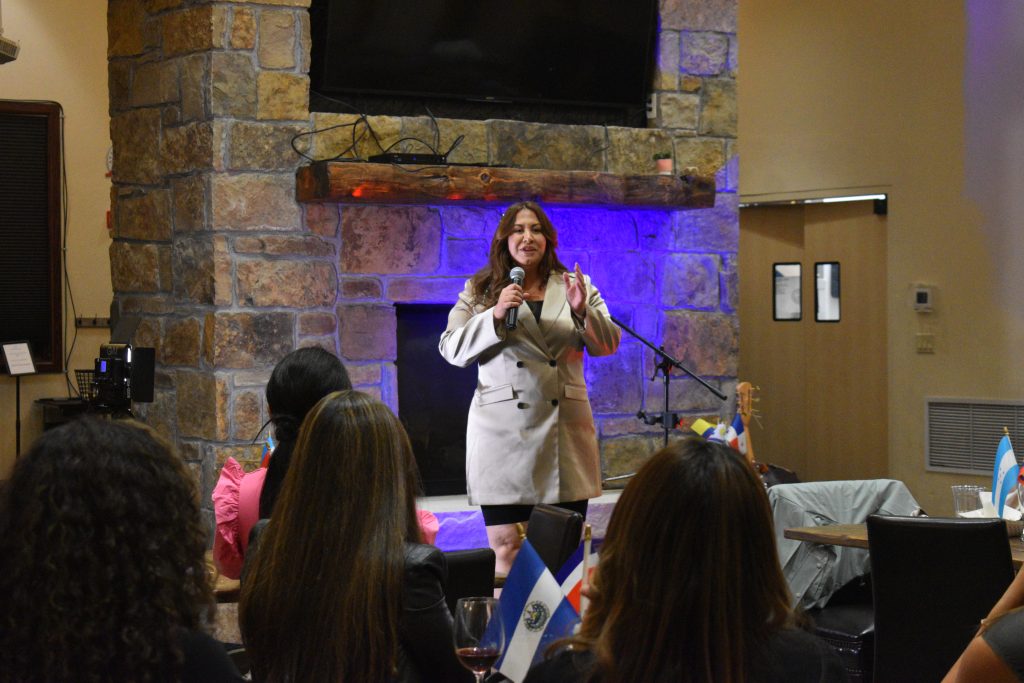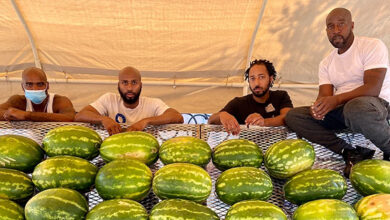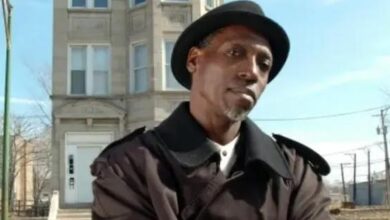Hispanic Heritage event celebrates the ‘working hands’ of Latino leaders in Garfield County

In October, Mariscal LLC hosted this year’s Hispanic Heritage Month celebration at Lakota Links in New Castle, dedicated to manos trabajadoras, or “working hands.”
Decorated with flags of Latin American countries and music played by a live mariachi band, the private event brought together roughly 100 Latino leaders from all around the mountain area to celebrate their heritage and achievements.
“This year, we will celebrate, recognize, and thank our Latino entrepreneurs,” the invitation said.
Guests arrived on their own time throughout the night in true Latino fashion — an additional indulgence to give these leaders a break from their very busy, punctual lives.
“We do it to give a break to the leaders,” said Crystal Mariscal, Latino community expert with Mariscal LLC. “It’s to thank them; it’s their time.”
The event welcomed multiple leaders to the stage, some of which were among the first to open their businesses in the valley, to share their stories of hardship, victories and building a life in Colorado as immigrants and children of immigrants.
“They’ve put the name of this valley on the map,” Mariscal said in Spanish, which was translated to English by the Post Independent. “We have so many Latino businesses in the valley … It lets us bring everything to light and be able to say, ‘Wow, look at all we’ve accomplished.’”

Stories of Success
Among these leaders were Gloria Castillo, Jose Luis Rico, Susie Meraz and Ignacio Mendoza.
Gloria Castillo is the owner of Gloria’s Boutique in Carbondale. Having arrived in the United States in 1982 and later Carbondale in 1989, she held many different jobs before she was able to open her own business.
“I love to help them with a smile, always,” Castillo said in Spanish.
During the end of her speech, she shared some of the more difficult parts of her story.
“I didn’t mention the hard parts, right?” she said. “I’ve been assaulted twice, they broke windows … It was when I was pregnant with my daughter.”
She shared the hardships of having to be apart from her children at times and missing important moments, and how proud she is of her family.
“When I graduated in 1994, there were no Latinos. Now, thanks to God, there are many Hispanics who are graduating,” Castillo said, voice breaking. “So support your children. Find ways to support them, because it’s such a pride to see them leave school, graduate, and pursue a career.”
“I’ve put effort into it, it hasn’t been easy, but what is difficult isn’t impossible,” Castillo added. “Some applause for me.”
The crowd happily granted her request, as the next speaker, Jose Luis Rico, was introduced.
Rico owns and operates Frida Authentic Mexican Food in Glenwood Springs with his wife, Emma Rico. Before that, he owned El Pollo Rico in Carbondale.
His speech congratulated everyone in the room for how far their efforts had brought them, and he shared his experience as a Latino business owners.
Rico acknowledged that although today Carbondale has many local businesses run by people who care for their community, he remembers a time when that was not the case.
“For those of us who are in the middle, who have several years under their belt … I want to ask everyone in the community to support the businesses of those who are just beginning — to give them an opportunity,” Rico said in Spanish, translated into English. “All of us, at one point, needed that opportunity.”
He recalled that when he first moved to Colorado, he wanted to do everything — everything except work in the food industry. He had already done that kind of work with his family growing up, and he dedicated himself to doing other types of jobs, such as construction.
“But I wasn’t so good at those things, to be honest,” he laughed. “What I already had in my blood was what I could do to serve other people.”
Rico said he felt he didn’t have the knowledge needed to open a business, so he used his discipline and savings to make it work.
“In Mexico, everyone knows that you open a curtain, and there’s your business,” he said. “You sell your tacos, whatever you want to sell, but not here. And I didn’t know that.”
Despite all the logistics and rules, he said he fell into a good place with opening his restaurant. However, not even a month later, he faced an empty dining room and a shrinking business.
“It’s a reality. All of us who have had a business need to persevere if we want to achieve our goals,” Rico said.
Just as he was about to go back to a job that he knew was secure and would get his bills paid, he remembered his dream.
“I understood that I serve a purpose. I understood that I needed to do something with my life,” he said. “Honestly, as a man, I cried like a man. I said, ‘Lord, I’m in your hands.’”
Little by little, as his business grew and more people came to love it, he began to use the business not only to provide for his four children, but to provide for his employees too.

The third person to speak was Susie Meraz, senior loan officer with Bay Equity Home Loans. Mariscal said Meraz is the go-to person for many women in the community who want to start a business. Her story as a daughter of immigrants and dedication to helping community members advance financially has won her national recognition, as well as the trust of the county’s vibrant Latino population.
“When you are a daughter of immigrants, you represent the dreams of your parents,” Meraz said in Spanish. “Thanks to their bravery and sacrifice, I was born here.”
Meraz grew up in the valley, at a time when Spanish wasn’t spoken outside of the home. She thanked her mother for encouraging her to grow up speaking the language and living the culture.
“And that’s our power as Latinos, the capacity to support each other and chase opportunities,” she said.
It was this power that inspired her to take the next step in her job as a loan officer in order to help community members obtain the tools necessary to fulfill their dreams of buying a house.
“Despite the challenges, I never lost sight of the objective to help our Latino community,” she said. “I can say that it wasn’t easy at first, and I had to learn how to connect both communities.”
Even when others told her that what she wanted to do was unrealistic and that she was spending too much time trying to resolve a problem, she remembered who it was all for.
“There is nothing more beautiful than learning the stories of my customers, knowing where they come from, their dream, their goals, and to (watch them) sign the papers … to their homes,” Meraz said. “And now I get to sell houses to the children of my very first clients.”
The last to speak, Ignacio Mendoza, shared his story of what it was like being among the very first Latinos to open a business in Carbondale.
Mendoza is owner of Mendoza Concrete, which he opened with his brother Jose Luis Mendoza.
“It was 1986 when … Ignacio Mendoza arrived in Carbondale, full of dreams and full of youth,” Mendoza said in Spanish.
He described Carbondale as he first saw it: smaller, sparser, and without a lot of business. It needed construction companies, stores and restaurants, but it also needed someone to start them.
“Those businesses are 18-hour, 16-hour jobs. If you’re not there, it doesn’t happen,” he said. “I’m very grateful to this great country for all it has given us, and for all we have been able to achieve here as Latinos. There are people who have had a harder journey to get here … it’s difficult. But if you have it, you have it. If you put your all into it, you can achieve it.”
After the speeches were all said and done, the four speakers were presented with certificates of achievement from Alpine Bank for their work in the community.
Accompanied by good food, drinks and music (and a few stolen centerpieces), the end of the celebration saw conversation and a few dances to the music of the mariachi.
Though the majority of the presentations were said in Spanish, anyone could have followed along with the upbeat mariachi music, especially with the room’s favorite lyric: “Tequila!”
“Before, we looked for anywhere with Hispanic Heritage month,” Mariscal said. “Now, we see Hispanic heritage month everywhere.”





